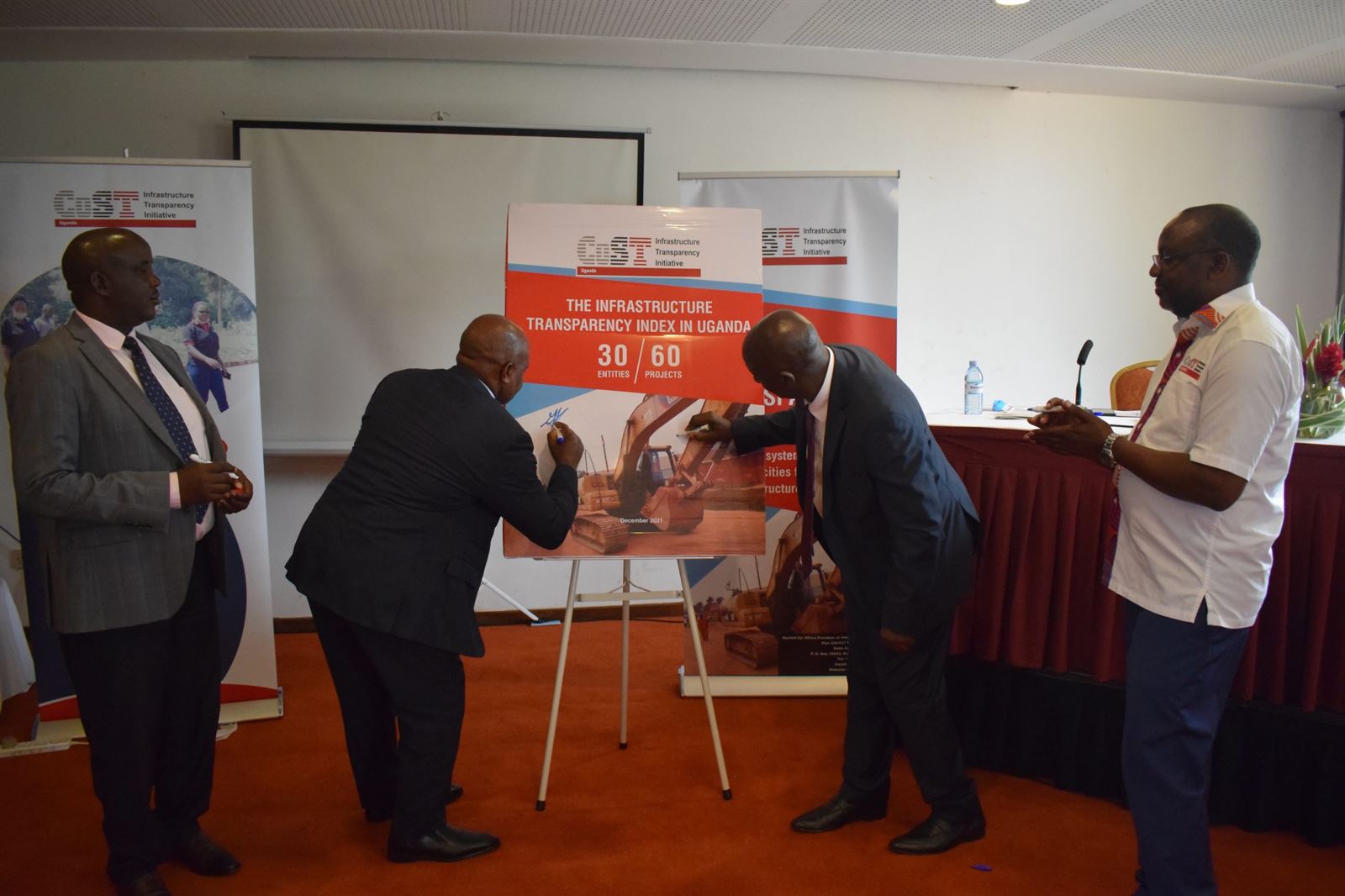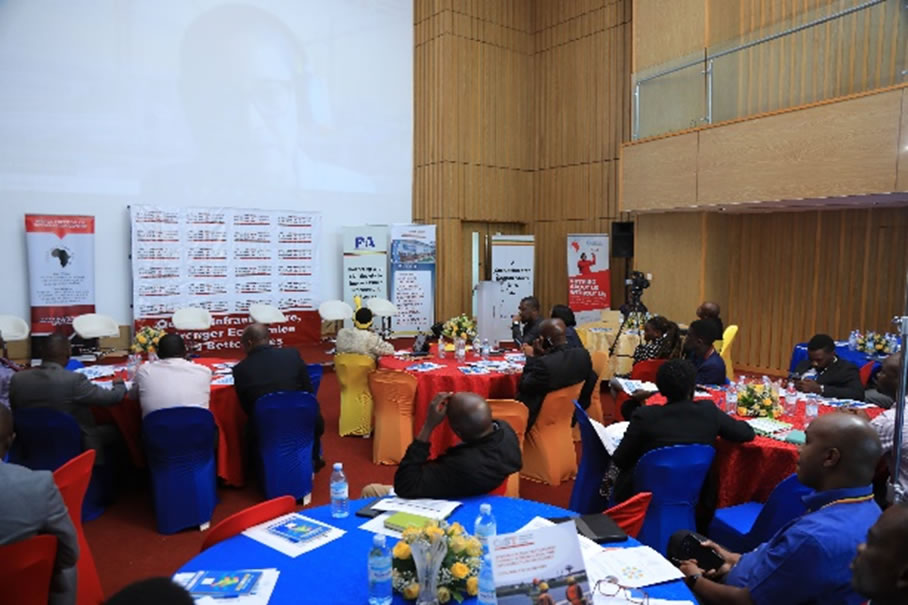
On 3rd December 2021 CoST Uganda launched results from its 1st Infrastructure Transparency Index (ITI) at the Kabira Country Club hotel, Kampala. The event that attracted 60 stakeholders was aimed at disseminating results of the first Infrastructure Transparency Index in Uganda. The index ran across 30 entities assessing 60 selected infrastructure projects and evaluating critical aspects of the national conditions for delivering public infrastructure projects. As part of this Index, CoST Uganda launched an ITI dashboard which presents live results of the Index.
Launching the ITI results, the Gen. Edward Katumba Wamala, the Minister of Works and Transport, who is also Champion of CoST Uganda noted in a statement read for him by the Commissioner Public Structures, Eng. Joseph Mukiibi that, Looking at the performance from different dimensions, Government will need concerted efforts to realize transparency in the sector. He expressed concern that Local Governments performance in the index was woefully bad, especially on disclosure, with nearly all the 15 local governments scoring less than 15%.
“My Ministry provides stewardship to the CoST Uganda programme. In my capacity as the Champion, I congratulate the inaugural winners of this index. As we celebrate your good performance, we challenge you to maintain this position in subsequent indices and call on other entities to take you over. Through the Index, several areas of strength were identified. Uganda has the requisite enabling environment at 41.1%, but, there is a need to strengthen compliance and implement sanctions to improve transparency, accountability and performance of infrastructure projects. With the low levels of transparency revealed by this index, I call upon respective Government entities, oversight bodies, state and non-state actors to note these areas of improvement and recommendations to inform positive change” reads the Minister’s statement.
The ITI’s mission is to review the transparency and accountability of public infrastructure continuously. The ITI’s objectives are as follows: to assess the state of infrastructure transparency and the capacity of procuring entities to improve transparency in the country; to track and encourage progress and facilitate peer learning, all while assisting in holding procuring entities accountable; and to raise awareness of transparency while building on existing data standards such as the CoST IDS and the OC4IDS.
Making opening remarks, the CoST International Senior Regional Manager for Africa, Mr. Gilbert Sendugwa called on Government to use the results to further understand the gaps within the system and conditions for delivering public projects. He noted that the Index provide us a framework for improving;
“The Board congratulates CoST Uganda and the Ministry of Works and Transport upon reaching this milestone, and commits to supporting the work of the national chapter. We also call upon Government to consciously implement the recommendations from this Index and the Assurance processes as a step towards implementing the CoST features” Gilbert Sendugwa, Senior Regional Manager for Africa, CoST International.
The index was guided by a methodology designed in the CoST International ITI Manual, which provides four dimensions: enabling environment, capacities and processes, citizen participation, and information disclosure. Each dimension is assessed against a list of standard indicators and sub-indicators under which each entity, project and dimension are measured and interpreted. In the first Index, the data collection process took a total of 88 days with the whole Index taking seven months, indicating the need to strengthen the appreciation of transparency in the sector. The major limitations the Index encountered was the COVID-19 pandemic and its associated challenges, the low levels of disclosure of infrastructure data and slow uptake of the index by public officials.
Making remarks at the launch of the Index results, Mr. Waiswa Bageya, the Permanent Secretary, Ministry of Works and Transport in a statement read for him by the Ass. Commissioner Quality Assurance, Eng. Ben Kyemba noted that; the work of CoST has continued to be valuable to the sector, keeping Government in check, but also making recommendations on how Government can build back better in this critical sector. He also acknowledged the fact that the process experienced low levels of responsiveness from entities.
“I understand that this process has been challenging, resulting from the low response rate, taking a period of seven months, with 20 entities not responding to the entity self-assessment survey. I call upon entities to attach much value to these initiatives especially, when they are to do with public funds. Government of Uganda has established various public sector management frameworks with much focus on transparency, accountability and citizen participation. It is critical that, public officials institutionalize and mainstream these issues as major tenets for service delivery” Waiswa Bageya, Permanent Secretary, Ministry of Works and Transport.
The index results reveal that the national ITI score in 2021 stands at 20.8%, representing the national enabling conditions and 60 projects and 30 entities across various sectors. Uganda’s performance in the enabling environment dimension is at 41.4%, information disclosure at 18.4%, citizen participation at 13.8% and capacities and processes at 13.5%. Local Governments performed least in the first Index with nearly all the thirteen assessed scoring less than 15%.
Three entities, including Kampala Capital City Authority (KCCA), Uganda National Roads Authority (UNRA) and Office of the Prime Minister (OPM), emerged the best performing across the various dimensions in the first Index with scores 62%, 58%, and 48%, respectively. There are notable inconsistencies with data published across the official public access to information platforms such as the Government Procurement Portal (GPP) and respective entity websites. Only one out of every five entities discloses infrastructure data proactively. Public officials lack capacity to disclose data, but also, lack capacity on the legal and policy framework in relation to transparency and accountability.
The index presents a framework for improving the enabling conditions for delivering infrastructure projects, calling on Government through its respective line entities to demonstrate a stronger political commitment to enhance infrastructure transparency, revealing itself in bold actions and implementing sanctions and incentives for non-compliance with the legal and policy framework across the entities. Strengthen citizen engagement (barazas) and make them mandatory across all projects, train public officials on disclosure and the legal framework, enhance institutional capacity and human resources across Local Governments, standardize disclosure and recognize the Index as an annual national performance indicator in the sector.



